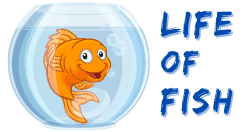If you are a person that loves bright colors in your aquarium, then Dwarf Rainbow fish will not disappoint you.
They are beautiful little creatures that love to stay in large schools. Their bright, rainbow colors and their playful nature will bring life to any aquarium, making it more appealing for your eyes.
Dwarf Neon Rainbowfish are, in fact, easy-to-care fish that need minimum care. However, these fish are not recommended for beginner aquarists. Why? We will explain it to you in a while.
This article covers everything you need to know when caring for Dwarf Neon Rainbowfish in your aquarium.
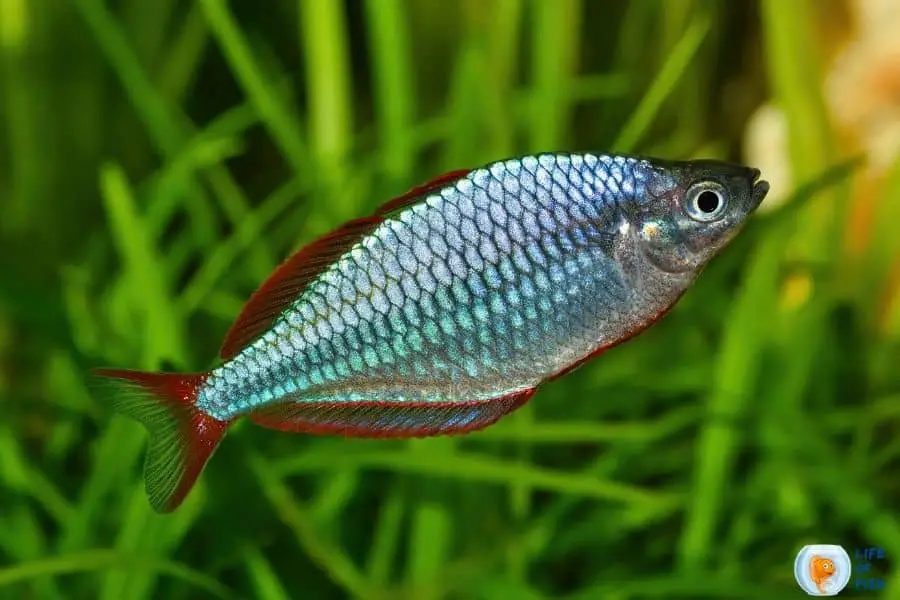
What is Neon Dwarf Rainbow fish?
Jump To
- 1 What is Neon Dwarf Rainbow fish?
- 2 Dwarf Neon Rainbow fish Appearance
- 3 How big do Dwarf Neon Rainbowfish get?
- 4 Is Dwarf Neon Rainbowfish aggressive?
- 5 Dwarf Neon Rainbowfish behavior
- 6 How long do Dwarf Rainbow fish live?
- 7 One look Care guide
- 8 Dwarf Rainbow fish care
- 9 Dwarf Rainbow fish breeding
- 10 Special tips
- 11 How to feed Dwarf Rainbow fish?
- 12 What fish can live with Dwarf Rainbow fish?
- 13 Dwarf Rainbow fish Diseases
Dwarf Neon Rainbowfish (Melanotaenia praecox) is a beautiful fish species of Rainbowfish from the family of Melanotaeniidae.
This fish is considered a tropical freshwater species that is endemic to the Mamberamo River basin in Western New Guinea and Indonesia.
Melanotaenia praecox has been popular with aquarists because it can be kept in community aquariums as long as you have a school of six or more individuals, but also friendly enough to be housed with other Rainbowfish.
Although these fish are not rare thanks to captivity breeding, you may not find these fish from large pet stores. But, you may find them in some smaller pet stores as well as online.
Dwarf Neon Rainbow fish Appearance
The Neon Dwarf Rainbow Fish is an amazing fish with many unique features.
Unlike some other types of freshwater dwellers, they have bright colors that can be seen easily in day and night activities such as feeding or schooling up at the surface level.
The males usually have red-colored fins, while female fins fall somewhere between yellow and orange.
The adult males usually have pinched-in faces, and both sexes have big blue eyes and twin dorsal fins.
The body color is pinkish-grey, but it changes to bright blue when they are exposed to light.
How big do Dwarf Neon Rainbowfish get?
Melanotaenia praecox reach up to 3 inches in length.
Unlike many other fish species, the male fish of these species grow more than female ones.
The average size of male fish is about 2.5-3 inches, while females grow for about 2-2.5 inches maximum.
Is Dwarf Neon Rainbowfish aggressive?
Dwarf Neon Rainbowfish are peaceful fish that get along with other community fish very well.
However, the male fish may become aggressive when breeding; If you keep a small number of these fish, the male fish attack and even kill other male fish in the breeding season.
However, you can avoid this aggression by keeping a large number of fish in your aquarium.
Dwarf Neon Rainbowfish behavior
When talking about the behavior of these fish, it is essential to say that they are highly intelligent fish.
They interact with other fish as well as things and people around the tank. They are very lively and curious, and they love to explore their surroundings.
Melanotaenia praecox is an enjoyable fish that you can watch from your aquarium for hours without being bored or tired of seeing them.
Dwarf Neon Rainbowfish is a schooling fish, and they require six or more of these lovely creatures in your aquarium for optimal health and well-being.
Melanotaenia praecox has been known as one of the most peaceful species of Rainbowfish as long as you have a large school of them living together peacefully.
To avoid the stress of these fish, you should house more females than males in a community tank. Otherwise, the males tend to attack and kill other males when breeding.
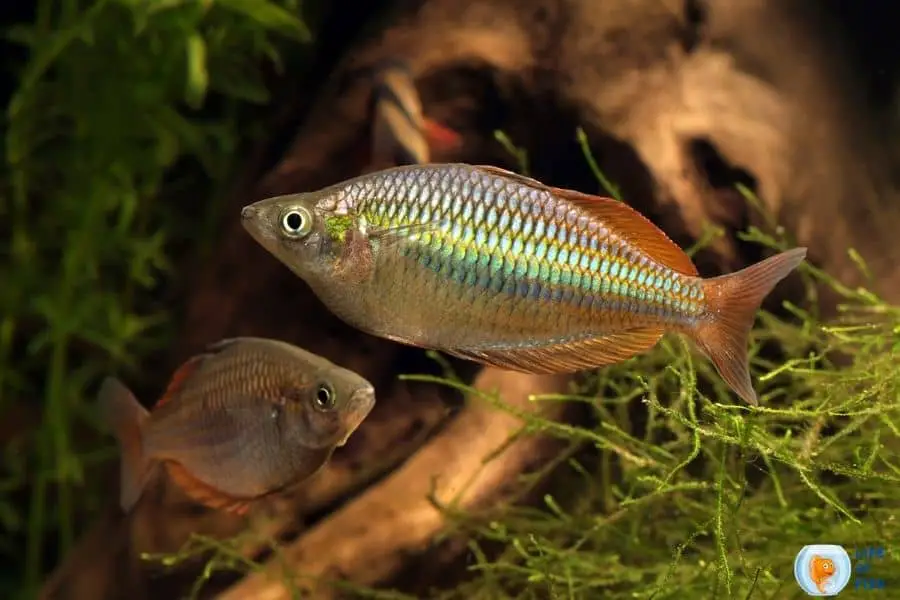
How long do Dwarf Rainbow fish live?
They live for a maximum of 5 years under optimum water conditions. However, their average lifespan is four years.
One look Care guide
| Scientific name | Melanotaenia praecox |
| Common name | Dwarf Rainbow Fish Dwarf Neon Rainbowfish |
| Care level | Moderate |
| Native to | Mamberamo River basin in Western New Guinea and Indonesia |
| Type | Freshwater Fish |
| Color | Rainbow colors |
| Tank size | 20 gallons |
| Preferred temperature | 72° – 82° F |
| Other water parameters | Hardness: 8 to 12 dKH pH level: 6.8-7.5 |
| Preferred salinity | No salinity |
| Size | up to 3 inches in length |
| Life Span | Up to 5 years |
| Temperament | Peaceful |
| Recommended tank mates | peaceful and slow-moving fish, bottom-feeder fish, shrimps, snails, and crabs |
| Preferred food | Carnivore, Fish pellets, Flakes, live and frozen food |
| Feeding frequency | Twice per day |
| breeding | Relatively easy, egg scatterers, continuos spawners |
Dwarf Rainbow fish care
They are actually an easy-to-care breed if you know how to control pH levels in your aquarium. They are quite sensitive to water conditions.
Melanotaenia praecox cannot tolerate fluctuating pH levels for a long time, which is one of the most common mistakes fish-keeping hobbyists make.
size of the fish
The average adult Dwarf Neon Rainbowfish size is about 2.5 to 3.2 inches (6.4 – 8 cm). The fish sold in pet shops will range from about 0.5 to 1 inch.
fish tank size
They require at least 20 gallons of water to thrive.
How many fish should be kept together?
It is best kept in schools of more than six individuals. Melanotaenia praecox will feel better and live longer if other Dwarf Neon Rainbowfishes surround them.
Tank setup
They do best when you give them a surrounding similar to their natural habitats.
In their native waters, they have sandy substrate, dense vegetation, and bogwood. Therefore, you should imitate these conditions in your aquarium.
Substrate
Sand or small gravel substrate is recommended with these species, preferably darker because they feel secure in a darker environment.
Plants
These fish prefer dense vegetation. So, be sure to add some plants to your aquarium.
However, at least a third or half of the aquarium should be open, especially in the middle of the tank. By setting up like this will encourage the fish to swim around this space.
Filtration
Just like any other fish, these fish also produce waste. So, it is necessary to install filtration and air pumps in your aquarium.
However, when adding any equipment, be sure to keep the water current at moderate levels.
Lighting
They prefer darker environments, but you can provide low subdued light to your tank.
Tank lid
It is important to cover the top of the tank with a lid because these fish are skilled jumpers and will jump when given the opportunity.
Water quality condition
Melanotaenia praecox are sensitive to pH levels. They are best kept in a slightly acidic aquarium with a pH range of about 6.8-7.5.
However, these fish prefer lower pH levels when breeding.
The water hardness should be between 8 to 12 dKH. However, these fish can tolerate a wide range of temperatures of about 72° – 82° F well.
So, as you see, although it is relatively easy to keep these water conditions, maintaining a stable pH range is something that only an experienced fish keeper can do well.
To keep the water clean, you have to do a 30% weekly water change so that the Dwarf Neon Rainbowfish will be healthy and clean all their life long. You can use a gravel siphon for this task.
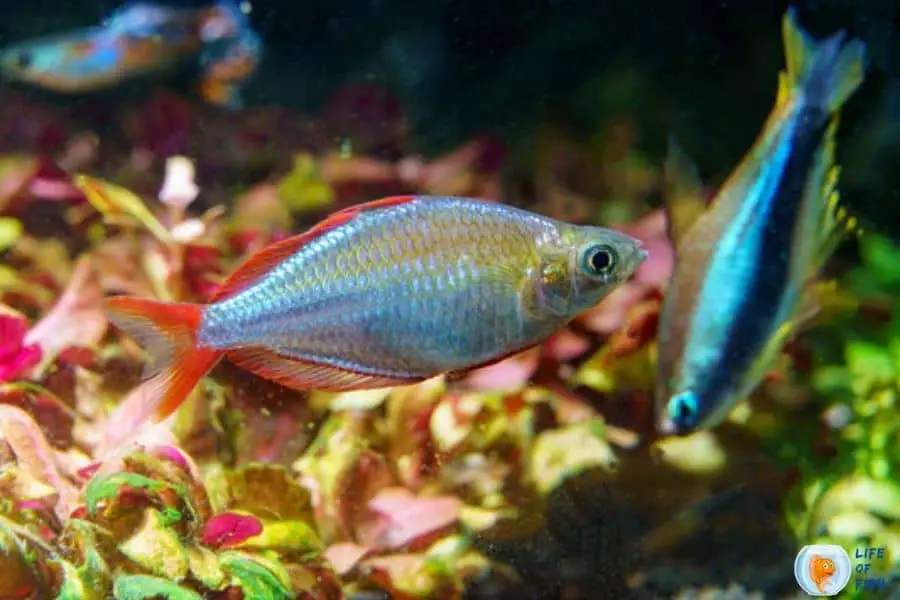
Dwarf Rainbow fish breeding
Just like other rainbowfish species, breeding these fish is relatively easy. They are egg scatterers that spawn at a pH of around 7.0 and a temperature of around 78.8F.
Unlike other egg scatterer fish, these are continuous spawners. So, you will have to follow general guidelines when breeding these fish.
Male or female fish identification
As we said before, Dwarf Neon Rainbowfish males are larger than females.
Further, adult males are brightly colored than females, with strikingly contrasting red fins and big blue eyes. They are slender than females.
Females, on the other hand, are smaller but are rounder than males. They do not have bright colors, but they still look quite lovely.
Female fish do not strike as the male counterpart but still, have bright colored Orange-yellow fins trimmed with silver and blue eyes.
Identify pregnant Rainbowfish and pregnancy stages
When the fish are ready to mate, the color of both fish gets sharper, and the female fish get more plumber.
These fish are egg scatterers that spawn over several days, even for months. So, you should take note of this when breeding these fish.
Dwarf Rainbow fish breeding
To successfully breed these fish, you will have to use two extra tanks; One for breeding the fish and one for keeping the eggs safe.
In the breeding tank, you have to change the temperature to 78.8 F and change the pH to around 7.0.
Do not use any substrate in the breeding tank. Instead, place moss-type plants or breeding mops.
Putting breeding mops is easier because you can easily take out the eggs once your fish spawn.
Otherwise, you will have to siphon the eggs to the other tank. You should place a small sponge filter and an air pump with low flow in both tanks to prevent eggs from sucking up and harming them.
When fish are ready to spawn, they shine with brighter colors than usual.
When you look at the fish together, you’ll notice that male fish flash back and forth in front of each other in what’s known as “displaying.”
It’s done to show off their genes for available females and warn potential rivals away. They will also become very protective concerning other males, frequently fighting with them to the point of death.
This behavior persists for several days. Pick one male and one female from among your flock that appears to be the healthiest, plumpest, and best color.
Then, put the couple in the breeding tank.
Since the breeding tank has water conditions that induce spawning, these fish will start to spawn in the breeding tank.
You will have to observe them spawning because they are egg scatterers and are tend to eat their own eggs.
While this is not common when you feed well, it can still happen. That is why we immediately remove the eggs to another tank after spawning.
Do not remove the adult fish to the main tank yet, because they continuously spawn for several days.
Observe when they spawn and transfer the eggs each time they spawn for better results.
How many babies do they have?
Since these are continuous breeders, it is often hard to tell how many babies they may have in one breeding session.
Some breed for several days, and some others breed for months.
Dwarf Rainbow fish fry care
Fry are so tiny and fragile in the very first few days. So, you need to be careful when caring for the babies.
They are smaller than newly hatched baby brine shrimp. Therefore, you can not feed them baby brine shrimp.
Either feed them with infusoria or powdered artificial plankton rotifer (APR) until they grow enough to eat baby brine shrimp.
Then start to feed them with baby brine shrimp and other small fry foods.
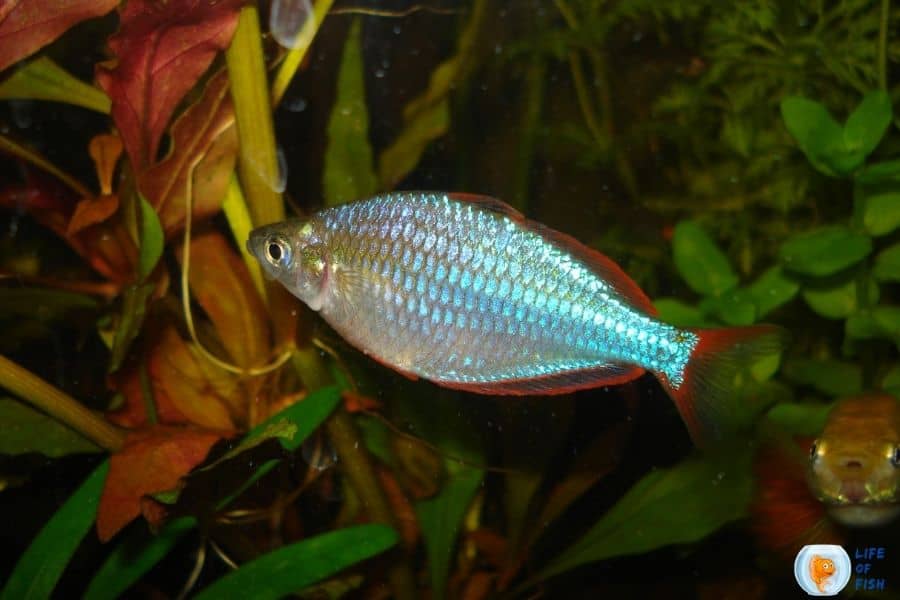
Special tips
Although you can house these fish in groups of 6, they do better in groups of 10 or more. So, if possible, get a bigger tank and keep at least ten fish together.
How to feed Dwarf Rainbow fish?
They are carnivore fish. So, the Dwarf Neon Rainbowfish diet should be rich in protein-rich food like live foods and good quality flake foods, with at least 50 percent of the food being meaty or fish/seafood-based.
You can also feed them with frozen foods.
For happy and healthy fish, diverse their diet with live or frozen food such as mosquito larvae, brine shrimp, and daphnia.
Dwarf Neon Rainbowfish are enthusiastic eaters. So, be careful not to overfeed them. Anything they eat within 3 minutes is enough.
If you find any extra food afterward, immediately remove them with a net.
What fish can live with Dwarf Rainbow fish?
Dwarf Neon Rainbowfish can be housed with other Dwarf Neon Rainbowish and many different kinds of community fish.
Dwarf Neon Rainbowfish is a very peaceful and active fish. So they can be accommodated with peaceful and slow-moving fish like Danios.
Since these fish are surface feeders, they never go to the bottom for feeding any excess food.
Therefore, it is essential to keep some bottom feeder fish like small pleco and catfish species.
You can also keep any shrimps, crabs, and snails if the water conditions suit them. Dwarf Neon Rainbowfish won’t bother these creatures as they are non-aggressive.
Speaking of which, you should not house these fish with aggressive or semi-aggressive fish species in order to not outcompete them for food.
You can keep any plant (submerged, floating plants) with these fish as they are carnivores. So, they do not harm your plants and love them for hiding when needed.
Dwarf Rainbow fish Diseases
Dwarf Neon Rainbowfish are extremely hardy fish.
They are rarely affected by disease or pests, but if your tank conditions are poor, they may be affected by bacterial or parasitic infections.
So, keeping optimum water conditions is a must to keep these fish healthy.
Additionally, you should quarantine any new creatures before adding them to the main tank to prevent diseases.
You should also clean any equipment well, preferably by bleaching and thoroughly washing them.
Read Next: Bioluminescent Jellyfish | 7 Illuminating Facts You Must Know |
